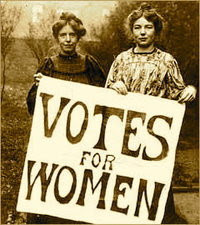19th Amendment Arguments Research
The 19th Amendment
The 19th Amendment, which granted women the right to vote, was ratified on August 18, 1920. The ratification of this right put an end to nearly a century of protest. The 19th amendment states "The right of citizens of the United States to vote shall not be denied or abridged by the United States or by any State on account of sex." The movement for women's rights pushed this amendment tremendously.
The Seneca Falls Convention of 1848 set the women's rights movement on a national level. This convention was organized by Elizabeth Cady Stanton and Lucretia Mott. It took place in New York, where more than 300 people attended, including women, and some men. According to history.com "most of the delegates at the Seneca Falls Convention agreed that American women were autonomous individuals who deserved their own political identities". After the convention the right to vote for women became the focal point of the women's rights movement.
Stanton also led a group of delegates who produced a "Declaration of Sentiments". It stated “We hold these truths to be self-evident: that all men and women are created equal; that they are endowed by their Creator with certain inalienable rights; that among these are life, liberty, and the pursuit of happiness.” Along with many other things, the sentiment meant that women deserved the right to vote. Later the press mocked this idea, therefore causing delegates to withdrawal their support towards the Declaration of Sentiments. However, Stanton and Mott continued to push for women's rights. After some time Susan B. Anthony and other activists joined them.
The following of the Civil War, and the 15th Amendment also greatly affected the women's right to vote. For example, "Stanton and some other suffrage leaders objected to the proposed 15th Amendment to the U.S. Constitution, which would give black men the right to vote, but failed to extend the same privilege to American women of any skin color" (history.com). However many did not agree with this idea. For example, in 1869 Lucy Stone and Henry Blackwell (abolitionists), created the American Woman Suffrage Association. Where they supported the 15th Amendment, and were worrisome that it wouldn't pass if it incorporated voting rights for women. Furthermore, in 1870, the 15th amendment was ratified.
In 1890, the NWSA and AWSA came together and created the National American Woman Suffrage Association (NAWSA). They campaigned for women’s voting rights on a state-by-state basis. In a period of just six years many states adopted amendments which allowed women the right to vote. Following many more incidents in the push for the women's right to vote, with 23-year-old Representative Harry T. Burns deciding vote, the 19th Amendment was fully ratified.
Create a blogpost (min. 2 paragraphs) that summarizes what you learned about this topic:
What arguments were put forth in favor of giving women the vote? Why do you think these arguments were put forth? That is, to whom might they have appealed? Which seem to have been based on principle, and which on practical 'selling' of the idea of the Amendment? Identify any famous people associated with these ideas.
What arguments were put forth for denying women the vote? Consider the reasons for these arguments.
Add an image and link to your research resource.
Be sure to follow the normal guidelines on quoting and paraphrasing.





Comments
Post a Comment